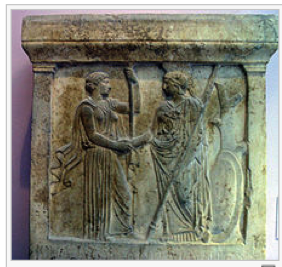According to Wickepedia “The first documented handshake in human history appears on the monument of Kalhu, showing the Assyrian king Shalmaneser III and Marduk-zakir-šumi I of Babylon shaking hands in a public display of Assyro-Babylonian friendship.”
Some say the handshake originates as a gesture of peace demonstrating that the hand holds no weapon. Nowadays handshaking is associated slightly more positive connotations; a greeting, a parting, offering congratulations, celebrating, expressing gratitude, good sportsmanship. Its purpose – to convey trust, respect, balance and equality.
It turns out there is a “proper etiquette” to handshaking as well, whereby the right hand is considered well and proper.
Perhaps unsurprisingly different countries have different customs when it comes to the handshake (see Wickepedia); Switzerland for example considering it polite to shake the women’s hand first, Russia considering this impolite (could make for some interesting encounters at UN meetings!).
Why a history of the handshake? Well it relates to a news story I was surprised (as were others) to see this week reporting the University of Phoenix ranked first according to Google searches for universities in 2014. Perhaps even more surprising, and with arguably bigger implications, was that the top European university searched was the Open University.
We’ll skip over the fact UCL and LSE both placed ahead of Oxford and Cambridge (but maybe a little glee that the former was ahead of the latter Oxbridge institute).
Two things in common have the first and third ranked institutes – high or complete reliance on online courses. In fact a large proportion of the top 20 listed institutes are also heavily weighted towards online course provision, known as ‘Moocs’ apparently. If you haven’t seen the Khan Academy (Circa 2006) check it out – apparently more people have than Cambridge University (Circa 1300).
The results show a marked change from 2011 when the most searched-for universities were conventional campus-based institutions. The general message is that universities need to be active with their online presence.
From my side, I feel there is still something about coming together with people to learn and experience in the same physical space, putting faces to names, and to shake hands. Which is why I’m looking forward to the next instalment of the Introduction to Evidence-Based Healthcare module in October.
The course is a particular favourite of mine as it introduces the key concepts of EBM (check out our Director’s latest blog for more on these). Topics covered range from study design to ethics. Critical appraisal is extensively covered and here I hope some of my own experiences will be of some use.
I’ve also been charged with looking after the online content for the course which has certainly go me thinking about innovative ways to enhance the learning experience. Hence why I came across the Google survey article.
Incorporating new technologies is going to be key. I’m no techie but my research has sprung a few gems. I particularly like the look of Google Glasses; prezi and the Khan Academy. I’d certainly welcome help with this and if you know of any useful technology then I’d love to hear about your experience. I’ll certainly be asking the course attendees their experiences and will blog about them next time.
